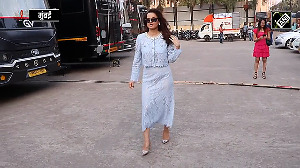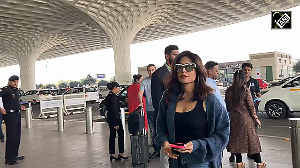The heart institute is Dr Koshal's labour of love. After he submitted his proposal for the institute, it took him 10 years to get the $125 million needed from the Alberta provincial government. At the 600,000 square foot Institute, that became operational in 2003, he performs about 250 surgeries each year.
"The heart institute is very, very unique and I am very proud of it," said Dr Koshal, 60, who did his MS at the All India Institute of Medical Sciences in New Delhi and completed his cardiac surgery training at the University of Ottawa Heart Institute.
He was a member of the teams that performed the first total artificial heart implant in Canada and the first implantation of the thoratec left ventricular assist device in the country.
In 1991, he moved to Edmonton as director, division of cardiovascular and thoracic surgery, University of Alberta, and surgeon-in-chief, cardiovascular surgery, University of Alberta Hospital. In 1995, he became the regional director of the Cardiac Sciences Program and in January 2006, he was named the director of development and external affairs for the Edmonton Heart Institute.
He spoke to Rediff India Abroad's Ajit Jain.
What does this honour signify for you?
It signifies the feelings of accomplishments and satisfaction. We live in this country and we have roots in India. We are able to pay back to this society. We should leave this world better than what we came into it. I hope in a small way I have contributed to that.
How does this recognition reflect on the community?
The community has been very supportive of us. When the heart institute started we received very strong support from the community. The Sikh community donated $2.3 million last year. They collected this money from small donors from all over the country. Their only condition was they would like the garden in the Institute to be named after Guru Nanak Dev, and we did that. It is a beautiful garden inside the institute.
You were also feted by the Canadian Physicians of Indian Heritage.
I received their distinguished service award. I was their only award recipient in 2008. The community has been very supportive of the work we have done, are doing at the heart institute. That's always nice.
Your thoughts on beating heart surgery?
Not many big centres are doing it. It has offered no special advantages excepting in some very selective cases. And we believe using pump is so good that we don't feel there is any special advantage of doing (it) the beating heart way. We do beating heart surgery, but not in every patient.
Dr Gopal Bhatnagar of the Trillium Health Center in Toronto says beating heart surgery is safer, especially in older patients.
I know Gopal Bhatnagar is very good at it. We also do surgeries in older patients -- as old as 90-year-old patients -- by using the pump. Some people do the procedure well but overall experience in research has been there's no significant difference in the outcome. It is mainly the comfort (zone) of the surgeon. Globally, only about 12 per cent (of heart surgeries) are performed as beating heart surgeries. Gopal Bhatnagar is an excellent surgeon and a good friend.
In our specialisation, we do different ways. And also someone has to collect large number of patients and document the results; then other people can change based on those findings. Right now there's no specific advantage of doing the beating heart surgery. It could be of some help in some selected older patients, who may have other complications.
So cardiac surgeries in older patients using the pump are safe.
Oh yes. It is the same surety and security for the life of the patients despite the age when we perform surgeries. I recently performed a bypass on a patient who was 91 years old. We had a patient 92 years old sometime ago. And beating heart surgery is only done in cases of bypass. If you need to change the valve you have to stop the heart and use the pump anyway.
Are South Asians at greater risk of cardiovascular diseases and complications?
Yes, it is due to our lifestyle; also it is genetic. We have incidence of diabetes and that's co-related with cardiac complications. There's no question the highest rates of heart diseases are in India. Indians, even in North America, are at a higher risk than the Caucasian population.
There are multiple reasons for that; we don't know all of them but we certainly see some of them could be genetic. Also lack of activity is a big problem in heart diseases. People who become active can reduce their risk of getting heart attack significantly. People say women don't have heart diseases. That's not correct.
Another factor of heart diseases is our eating habits, our diet. We South Asians say we are vegetarians. We forget that food may not always be healthy. We use a lot of saturated fat and everything else combined does make it a serious cocktail for heart diseases.
We are starting to change our lifestyle. We are getting more active. One of my next projects on which I am focusing my attention during the last two years has been in the area of prevention.
For the first time in the generations of mankind, a child born today may not outlive his/her parents. That's scary.
That is irrespective of the child's ethnicity.
That's correct. Also, we South Asians come here (to North America) and get Westernised. We pick up some of their bad habits. This applies to our children as well. Childhood obesity is a significant problem here.
The Internet has taken over from television now. People sit in front of their monitors for hours and do nothing. As yet we don't have a term like couch potato for Internet users. Some such term should start to develop so that people understand that the Internet may have other advantages, but it also co-relates to people prone not to be very active.
People are now widely aware of the danger of smoking. That's good. Cholesterol is higher amongst Indians and people are quite aware of that also. And we have to work with diabetes, but lack of activities is still a serious danger sign.
What about your project on prevention?
I am a surgeon, but I would be remiss if I don't focus on prevention. I feel we owe it to our society that we have a healthy society. Certainly people are living longer and we have a healthy population. I have submitted a $25 million prevention project to the Alberta government. My project will do multiple things; it will involve surveillance. We are fortunate in Alberta to have electronic health files of 78,000 out of 90,000 diabetes patients in the Edmonton area. If and when there's a need, we can quickly contact their immediate relatives.
It gives us the way to monitor them; once in a while just giving them pamphlets, discussions on radio, etc, don't help till we regularly monitor them. So, these people don't have to come to hospital. These people can be at home and every two months these people can contact our counsellors who are experts in changing behaviors of people. That's the only way.
The prevention project is complex as it also involves the environment. It also involves work for the government to change its role. If we can do it in New York City, why can't we do it in Canada? The work on the prevention project is already underway though as yet I haven't received $25 million.
Are South Asian cardiac patients still afraid of surgery?
There are some recent immigrants, first generation people. They are apprehensive of surgery.
In cardiac areas, there's so much of progress now that mortality rate has declined to a mere 1 per cent. Of course there are some complex cases where there could be higher mortality rate, but overall cardiac surgery now is very safe. We do the highest number of transplants in Edmonton. The results are very, very satisfying.
We do see a bit of hesitation in our population, but awareness is getting there. Now some of the communities even in the Edmonton area have programs for activities for seniors. That's a good thing. After surgery these people have to know there are these community centers where they can go regularly for exercise.
We have to encourage people towards practicing prevention, adopt preventive measures so that they can enjoy a quality, long life. That's what as a surgeon I advise them before the surgery and after the surgery. And the good part is they are responding. We have a great deal of family support, which is different than in other cultures.
Your message for South Asians?
We are fortunate to be living in North America where there are lots of avenues for prevention, for diagnosis and treatment. The important thing is to utilise them. There's a bit of self-denial amongst our people: 'No, no I can't have any cardiac complication.' If you have any problem, please get yourself checked early and treated.
We focus on prevention and the prevention results would manifest in a few decades. We can improve our chances of a healthier life but please get yourself treated and then go for secondary prevention.






 © 2025 Rediff.com -
© 2025 Rediff.com -